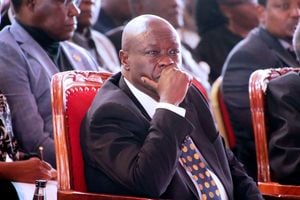The life and turbulent times of King of pop

U.S. pop star Michael Jackson gestures during a news conference at the O2 Arena in London in this March 5, 2009 file photo.
What you need to know:
- He became a star when he was a child, but scandals destroyed the career
The nights are getting darker: Farewell Michael Jackson. — Jermain Jackson, August 29, 1958 — June 25, 2009
Seeing Jermaine Jackson tearfully announce the death of his younger brother Michael must have reminded Kenyans of the 1987 All Africa Games concert.
The concert very nearly became a fiasco when an American promoter called Dick Berg fled the country on the heels of his false promise that the Jacksons would grace the occasion. It was Jermaine who saved face on that occasion with what was a hurriedly organised performance.
Jackson had an interesting relationship with Africa. In 1982, he unwittingly pirated significant riffs from Manu Dibango’s 1972 classic, Soul Makossa, for the much-acclaimed Wanna Be Starting Something. Dibango was swift to sue. It is said he dropped the case only when he was made joint songwriter.
But this year, Dibango sued Michael jointly with Rihanna after she used a portion of Michael’s Wanna Be Starting Something without acknowledging the Cameroonian.
The fact that an artiste born to a Senegalese Djembe percussionist and jazz musician in 1973 and partly raised in Senegal sought out Michael Jackson for a collaborative duet, says so much about the global impact of Jackson’s art.
It also points to the indelible mark that he has left on Africa’s cosmopolitan identity and the social imagination of at least two generations of Africans.
On Hold My Hand, the much pirated and yet-to-be-released epic collaboration with Akon, Jackson’s lines sound strangely prophetic:
This life don’t last forever (hold my hand) So tell me what we’re waiting for (hold my hand).
And Akon, with his new commitment to find and work with all those musical icons who defined his childhood and influenced his style (he also has a duet with Whitney Houston and another with Lionel Richie) takes on lines that echo his sense of responsibility over struggling older musicians:
Cause I’ve been there before And you’ve been there before But together we can be alright.
And then the duo chimes in together:
Cause when it gets dark and when it gets cold We hold each other till we see the sunlight.
The soundtrack that dominates the lives of all those East Africans who grew up tuned into the English service of state-owned radio broadcasting is doubtlessly filled with unforgettable lyrics from Motown Records where Jackson and his brothers, together called the Jackson 5, recorded four No. 1 hit singles in 1969, their first year at Motown.
There were no commercial music videos in those years and upon their release in the US vinyl records took nearly two years to make the long sea voyage to the East African coast.
Once inside the charming walls of Ebrahim Camera Shop, Assanands, and Melodica the only outlets that sold imported music in Nairobi, these albums were largely unaffordable for the bulk of teenagers who knew the songs.
And so we hang on to our radios and from Breakfast Club to Yours for the Asking, Beat Time and Late Date there was sure to be a Jackson 5 song to make your day.
There were no websites from which we could download the lyrics to I Want You Back and I’ll Be There. We listened to songs over and over and penned the lyrics on school exercise books in moments when we should have been studying Mackeen’s Introduction to Biology.
The revered copies of Jet magazine, Right On and thumbed-out issues of Ebony reached us many years after they had hit Los Angeles, London and New York, but we dutifully tore off the posters and pinned them onto our walls.
On the state-run television, we watched ancient editions of the Jackson 5 cartoon series and occasionally caught belated glimpses of the talent of Michael, Marlon, Jackson, Tito and Randy on Soul Train.
Later, we were to watch Dionne Warwick’s Solid Gold, a highly controversial show that brought Martin Shikuku to his feet on the floor of Parliament to protest at the wanton nakedness and lewd dancing that the state broadcaster was recklessly introducing into family living rooms.
We ignored Shikuku’s protest as tasteless and out of date. How else were we to get close to the icons of our time; to these geniuses who echoed our romantic stirrings; who gave us the idiom of love and the grammar to define the things we wanted to achieve in life?
Back in the 1970s, there was only a select clique of East Africans who travelled to London and America. Invariably, they were a little too old to bother hauling back stacks of Motown records and piles of Ebony.
So all of these were rare and much treasured commodities, and their possession marked the social and economic aspirations of our cosmopolitan generation.
Enter the 1980s and the audio and video cassette recorders. By now we were taping the music straight from the radio and unto the reasonably priced audio-cassettes.
Jackson had left Motown and broken off from J5 to pursue a more promising solo career at CBS Records. He was still brilliant. Watching the video of Rock with You you knew Jackson was on to an incredible new thing.
That thing was Thriller, the highest selling album of all time, designed so that each song on the album was itself a hit single. And then Michael turned up for the Motown at 25 concert in May 1983.
His I Want You Back with his brothers was deeply moving, but it was his rendition of “Billie Jean” that totally rocked that night and signalled the radical shift that Motown had failed to make.
With his moonwalk, his white socks and his Thriller jacket, Jackson somehow convinced us he was immortal.
Michael can’t be dead! He used to sleep under an oxygen tent, he wanted to live forever, he said so in numerous interviews.
In the 1990s he visited Tanzania as a tourist, and wore a mask to escape our toxic exhalation. And he stayed away from Kenya. He couldn’t trust us with his security; he wouldn’t risk further exposure in unhygienic places.
Jackson had shocked so many of us with that first “nose job” and when he bleached his face.
We had somehow tolerated these acts of self-denial and warped identity from our Zairois musicians but when Jackson did it we were angry. His music had been as much about tender loving care as it was about making space for blackness.
It was music of self-assertion in an era of the civil rights movement in America and decolonisation in East Africa.
Jackson had shown us so many times that we were as good, no, we were the best in many fields; how now could he turn his back on our being and do so much to make himself look “other”?
But even in those dark moments of real irritation with Jackson, we never stopped loving Billie Jean, or Rock with You.
It didn’t stop us from applauding his brilliance.




